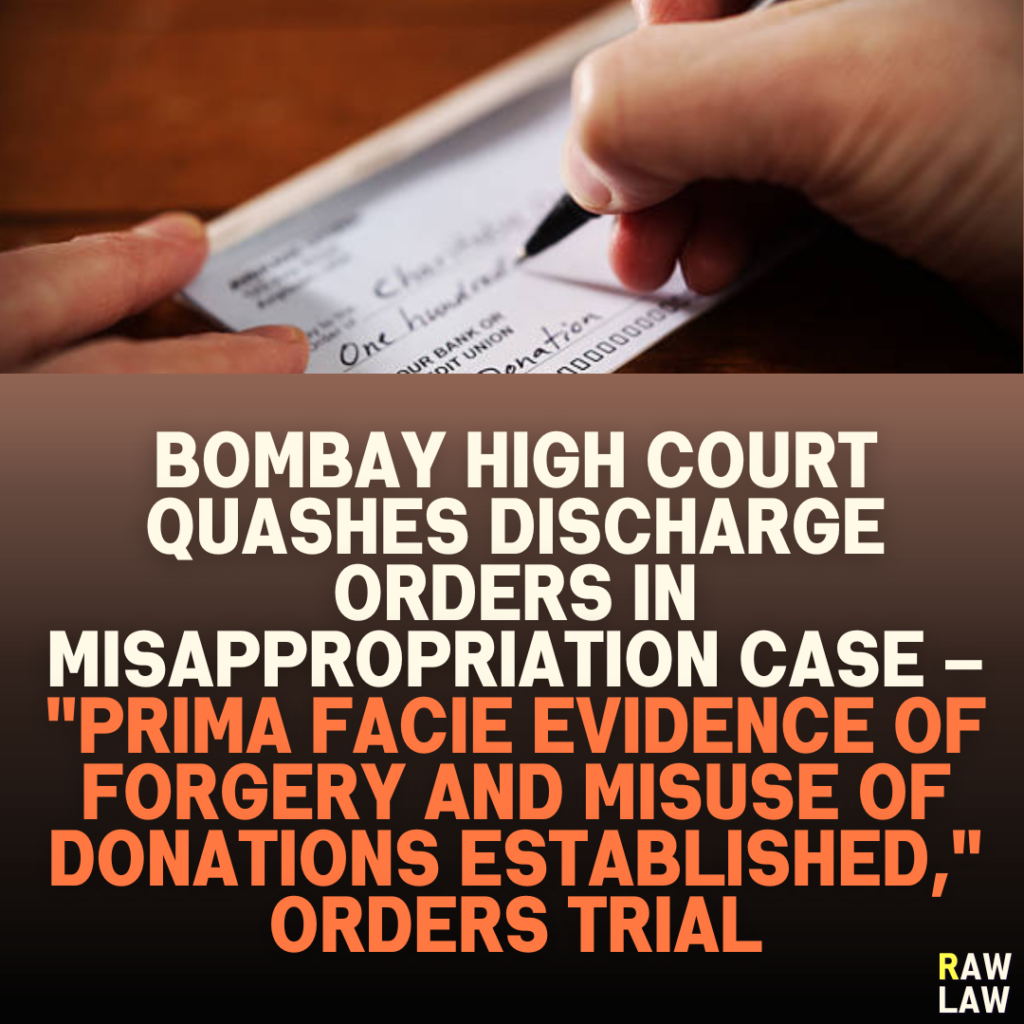Court’s Decision:
The Bombay High Court quashed the order of the Chief Judicial Magistrate (CJM) and the Additional Sessions Judge, which had discharged the accused in a case involving misappropriation of donations by trustees of an educational society. The High Court held that the lower courts erred in relying on documents submitted by the accused, rather than the material presented by the prosecution under Section 173 of the Cr.P.C. The court ruled that the documents submitted by the prosecution established a prima facie case for framing charges against the accused under various sections of the IPC and the Maharashtra Educational Institutions (Prohibition of Capitation Fee) Act.
Facts:
The petitioner had lodged a complaint against office bearers and trustees of the Mahatma Bashweshwar Education Society, alleging that they had accepted donations from students for admission to the society’s colleges between 1983 and 1992. These donations were not deposited in the college or society’s accounts but were allegedly shared among the accused. The petitioner argued that the accused had manipulated records for audits, thereby committing forgery. The police had filed a charge sheet accusing the respondents of offenses under Sections 420, 468, and 471 read with Section 34 of the Indian Penal Code (IPC) and the Maharashtra Educational Institutions (Prohibition of Capitation Fee) Act.
Issues:
- Whether the accused were wrongly discharged by the CJM and the Additional Sessions Judge?
- Whether there was sufficient material to frame charges against the accused under Sections 420, 468, and 471 of the IPC and relevant sections of the Maharashtra Educational Institutions (Prohibition of Capitation Fee) Act?
Petitioner’s Arguments:
The petitioner argued that the lower courts erred in discharging the accused, ignoring material evidence, including statements from students and parents supporting allegations of donation collection by the respondents. The petitioner further argued that the CJM and Additional Sessions Judge incorrectly relied on documents presented by the accused, which were not part of the investigation report. These documents, according to the petitioner, were improperly considered to exonerate the accused without appropriate evaluation of the prosecution’s evidence.
Respondent’s Arguments:
The respondents contended that during the period in question, they were not in positions to accept donations. They argued that the allegations were vague and unsubstantiated, with no direct witness testimony stating they had received donations. Additionally, they claimed that one of the accused, who had been removed from trusteeship on similar grounds, was not named in the complaint. The respondents asserted that no offense under Section 420 of the IPC was made out based on the allegations.
Analysis of the Law:
The court examined the provisions under Sections 239 and 240 of the Cr.P.C., which govern the discharge of accused persons. It emphasized that a Magistrate, while deciding on an application for discharge, must rely solely on the material submitted with the charge sheet under Section 173 of the Cr.P.C. and not on documents submitted by the accused. The court clarified that the role of the Magistrate is to assess whether a prima facie case exists, rather than determining the sufficiency of evidence for conviction at the stage of framing charges.
Precedent Analysis:
The court referred to several judgments, including State of Orissa vs. Debendra Nath Padhi and State by Inspector of Police vs. S. Selvi, which held that documents submitted by the accused should not be considered at the stage of framing charges. It was reiterated that the Magistrate must assume the prosecution’s evidence is true and evaluate whether the facts disclosed constitute an offense.
Court’s Reasoning:
The High Court reasoned that both the CJM and the Additional Sessions Judge had erred by considering documents submitted by the accused while ignoring the prosecution’s material. The court found that the prosecution had provided sufficient material to establish a prima facie case of forgery and misappropriation of donations. The documents and witness statements presented by the prosecution established a connection between the accused and the alleged offenses, justifying the framing of charges.
Conclusion:
The High Court quashed the discharge orders and directed the trial court to proceed with the case in accordance with the law. It rejected the respondents’ request for a stay of the proceedings.
Implications:
This judgment reinforces the principle that at the stage of framing charges, the court must rely solely on the prosecution’s evidence and not on materials submitted by the defense. It also clarifies the standard of review for discharge applications, ensuring that accused persons cannot prematurely escape prosecution by submitting exculpatory documents before trial.




Pingback: Supreme Court Oversees Construction of Bombay High Court’s New Building, Directs Continued Monitoring for Timely Land Allocation and Implementation of Structural Report by December 2024 - Raw Law